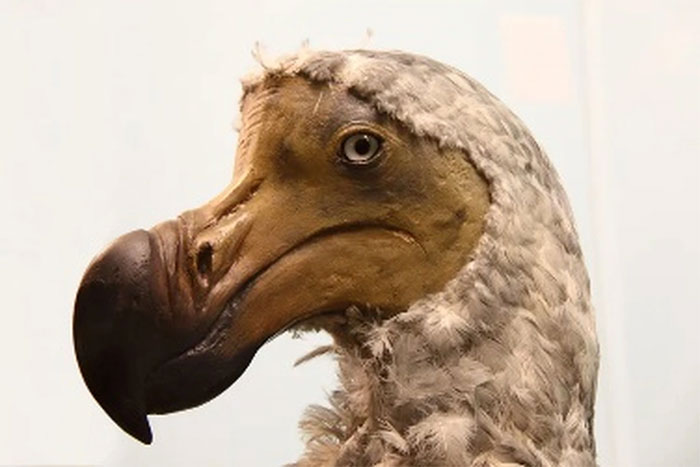600 bird species extinct due to humans, countless ecosystems damaged
Without effective conservation strategies, bird extinction will have catastrophic consequences.
Human impact on nature has not only caused hundreds of bird species to disappear, but also fundamentally altered the important role these animals play in the global environment.
A study conducted by the University of Birmingham, UK, has warned of the biodiversity loss crisis the world is facing.
Specifically, scientists have assessed the consequences of the current rapid decline of bird species for future ecosystems. The information they collect is vital to helping countries set effective targets for global nature conservation, ecosystem restoration and wildlife rewilding.

The extinction of the Dodo bird led to the extinction of other species on the island of Mauritius (Photo: Gunter Hofer).
About 600 bird species are thought to have gone extinct in the past 12,000 years , disrupting the natural order in their native habitats.
Tracking the impact of individual bird species loss is important to provide information about the potential consequences of future mass bird extinctions on the environment as a whole.
"Each species has a task or function in the environment and therefore plays an incredibly important role in the ecosystem," said Dr Tom Matthews, who led the study.
Some birds eat pests and keep them from spreading, scavengers recycle dead matter, others eat fruit and spread seeds, allowing plants to grow more, and some, like hummingbirds, are important pollinators of flowers. When these animals die, their importance is lost.
It is well known that humans are the dominant species and are also the cause of the sudden extinction of other species that have coexisted on this planet for thousands of years.
From 300,000 years ago, when the first humans appeared in Africa and began migrating globally, until now, we have continuously exploited the Earth's natural resources.
As humans abandoned their nomadic lifestyle and began settling in communities and cultivating land around 12,000 years ago, the inevitable rate of extinction of other species accelerated.
Their habitats have been cleared for human agriculture, affecting local biodiversity, and hunting of wild animals for food and protection from predators has reduced the numbers and led to the extinction of entire animal families.
Such cases are called human-caused changes in nature.
Research from the University of Birmingham highlights the devastating impact of bird loss on the natural environment. Scientists have found that the loss of individual bird species has far-reaching effects beyond the immediate damage.
The obvious damage we are seeing includes reduced pollination of flowers, reduced ability to disperse plant seeds, disruption of top-down control of insect populations, including many pests and disease vectors, and increased disease outbreaks due to reduced carrion disposal.
But beyond those direct consequences, scientists have noted that the extinction of a species will stop the natural evolution of that species , or phylogenetic diversity, which will fundamentally change the way the entire environment develops.
For example, reduced pollination capacity of flowers affects the ability of not only an individual but also a group of plant species to adapt to climate change.
Dr Matthews said the research showed that the current extinction crisis is not just about species numbers, but also highlights the urgent need for us to understand and predict the impact of human-caused extinctions on ecosystems.
- More than 500 species of birds in the world are extinct
- Development technology revives extinct species?
- Found the idea of extinct birds
- Use robots to find birds
- Discovering the 'love path' where 5 species of humans mate in deformities
- 10 strange extinct animals
- Video: How did people destroy nature?
- The giant bird in Australia is extinct due to excessive hunting
- Bird of prey 'missing' for half a century discovered
- Protection of mangrove ecosystem in Mekong Delta
- The skeleton of extinct birds cost more than $ 430,000
- Which species will 'inherit' the Earth when humans become extinct?
 Discovered an ancient centipede fossil 99 million years old
Discovered an ancient centipede fossil 99 million years old Discovered bat-like dinosaurs in China
Discovered bat-like dinosaurs in China Discovered a 200-year-old bronze cannon of the coast
Discovered a 200-year-old bronze cannon of the coast Discover 305 million-year-old spider fossils
Discover 305 million-year-old spider fossils Four new species appear as 'hybrids' of extraterrestrial creatures
Four new species appear as 'hybrids' of extraterrestrial creatures  Strange species in Southeast Asia becomes the first marine fish species 'extinct due to humans'
Strange species in Southeast Asia becomes the first marine fish species 'extinct due to humans'  Ancient humans may still live on Indonesia's Flores island
Ancient humans may still live on Indonesia's Flores island  The 'dragon' species that was thought to only exist in myths is one of the rarest on the planet.
The 'dragon' species that was thought to only exist in myths is one of the rarest on the planet.  How many animals have ever existed on Earth?
How many animals have ever existed on Earth?  Treasure of Southeast Asia: Rare animal species found in only 9 countries in the world, Vietnam just received good news!
Treasure of Southeast Asia: Rare animal species found in only 9 countries in the world, Vietnam just received good news! 